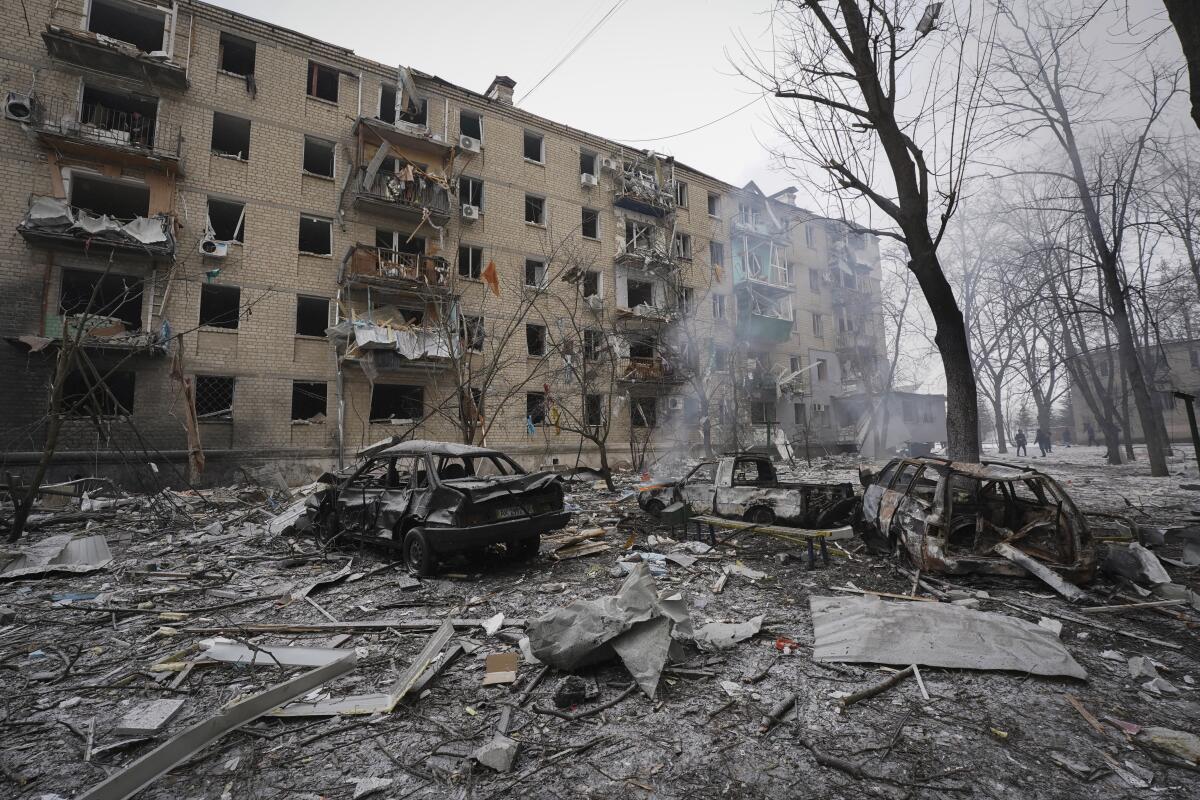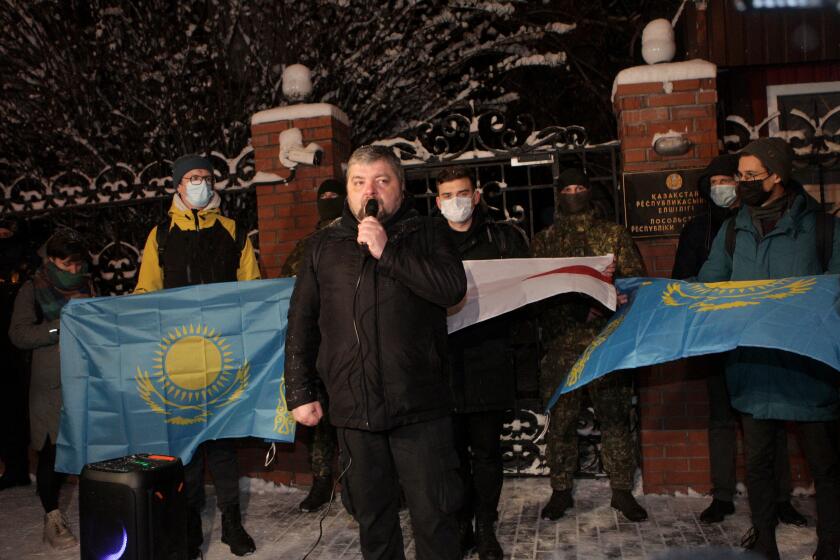House Speaker Mike Johnson must stop dithering on Ukraine aid and hold a vote

- Share via
Two years after Russia’s brutal and unprovoked invasion, Ukraine continues to defend its territory bravely but has withdrawn its forces from a key city under attack and is short of weapons and ammunition. But because of partisan paralysis in Washington — and the malign influence of Donald J. Trump — a proposal for tens of billions of dollars in additional assistance remains stalled. President Biden has fairly accused House Republicans of “walking away from the threat of Russia.”
Earlier this month the Senate voted 70-29 to pass a bill that would provide Ukraine with an additional $60.1 billion. It also includes $14.1 billion to assist Israel as it battles Hamas and nearly $10 billion for humanitarian aid for Palestinians and other civilians caught in war zones. If a vote on the Senate bill were held, there is a good chance that the House would approve it.
The biggest worry for Ukrainians is what’s happening in Washington: Will the U.S. continue to help, and with what level of support?
Yet House Speaker Mike Johnson (R-La.) has yet to agree to hold a vote on the aid package citing the Republican mantra that desperately needed aid for Ukraine must be linked to restrictions on migration at America’s southern border. “House Republicans were crystal clear from the very beginning of discussions that any so-called national security supplemental legislation must recognize that national security begins at our own border,” Johnson huffed.
Never mind that a bipartisan group of senators, with the encouragement of the White House, came up with a compromise bill that would have done exactly that, only to face opposition from Senate Republicans and Trump. Before the text of the compromise was finalized, the former president and likely Republican nominee blustered that “I do not think we should do a Border Deal, at all, unless we get EVERYTHING needed to shut down the INVASION of Millions & Millions of people, many from parts unknown, into our once great, but soon to be great again, Country!” Johnson similarly objected that the compromise proposal contained “insufficient border provisions.”
Republicans have been softening their stance on Russia ever since Trump won the 2016 election after Russian hacking of his Democratic opponents.
Johnson reportedly has sought a meeting with Biden to talk about funding for Ukraine and Israel, and the president is open to such a discussion. Some House members are also pressing for a separate measure that would be less generous in aid to Ukraine. But time is of the essence. The Senate-passed bill provides an appropriate level of new funding for Ukraine. The House should expeditiously vote on it.
That it hasn’t done so is a reflection of a larger problem in the Republican-controlled House (and we use the term “controlled” loosely). Because the party’s majority is so narrow, a small group of extremists has exerted disproportionate influence, including in the successful effort to topple former Speaker Kevin McCarthy. McCarthy launched — and Johnson endorsed the formalization of — a baseless impeachment inquiry into Biden that has become an embarrassment for the party.
Republicans blocking aid to Ukraine should consider the bravery of advocate Maksym Butkevych, who was captured by Russia after joining his country’s defense.
The dysfunction of House Republicans reflects the lamentable influence of Trump. His isolationist “America first” approach to foreign policy meshes seamlessly with opposition to more aid for Ukraine. Trump recently suggested that any aid for Ukraine be in the form of a loan, because “we should never give money anymore without the hope of a payback or without “ ‘strings’ attached.” Of course, there is already “payback” for the United States and its NATO allies in Ukraine’s valiant resistance to Russian aggression. If Vladimir Putin is frustrated in his attempt to subjugate Ukraine, he will be less likely to menace neighboring NATO countries.
To be fair, the opposition to new aid for Ukraine is not completely the result of Trump’s influence. Even some Americans who wish Ukraine well and recognize the immorality of Russia’s aggression may wonder if it’s realistic to hope for a total Ukrainian victory, even with continued aid from Western nations.
As the fighting drags on, the notion of a negotiated settlement becomes more attractive. It’s indeed possible that the war might end through negotiations with concessions by Ukraine such as autonomy for pro-Russia inhabitants in the eastern part of the country. But, as Biden has persuasively argued, strengthening Ukraine on the battlefield puts it in the strongest possible position at the negotiating table.
Biden recently put the point in poignant terms, “Look, the Ukrainian people have fought so bravely and heroically,” he told reporters. “They’ve put so much on the line. And the idea that now when they’re running out of ammunition, we walk away — I find it absurd. I find it unethical. I find it just contrary to everything we are as a country.”
Johnson should stop the dithering and schedule a vote.
More to Read
A cure for the common opinion
Get thought-provoking perspectives with our weekly newsletter.
You may occasionally receive promotional content from the Los Angeles Times.












